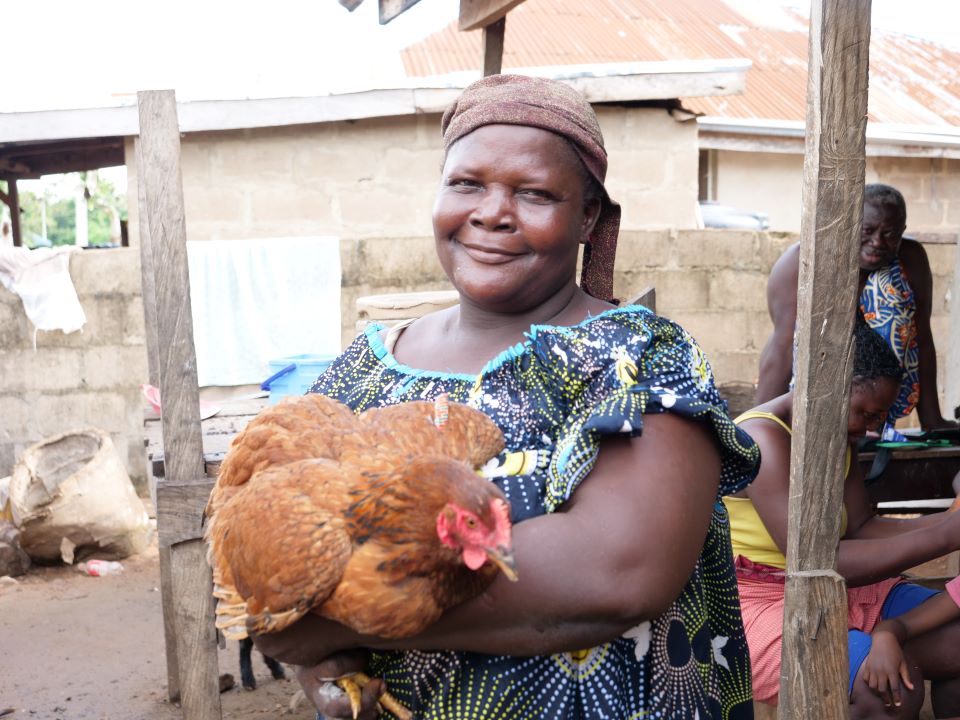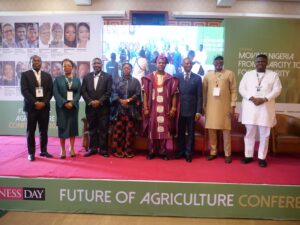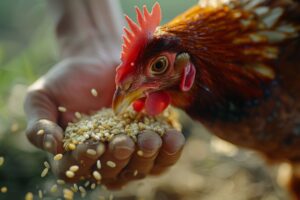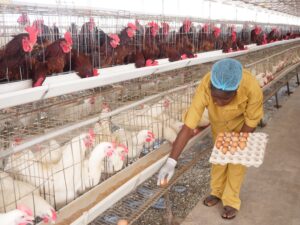A Noiler Farmer
The distinction between Broilers and Noiler birds lies fundamentally in their breeding and intended uses. Broilers are strategically bred for efficient meat production, while Noiler birds offer a versatile balance between egg-laying and superior meat quality. Among the various breeds of Broiler birds globally, popular ones include Ross 308, COB 500, Arbor Acre, and Marshall. Noiler was developed by Amo Farm Sieberer Hatchery Limited in Nigeria, offers a versatile balance between egg laying and decent meat quality. Similar in taste to native chicken but reach 3x the size in a shorter time, and lays 4x the number of eggs, making it ideal for family farms. Let’s delve deeper into their specific characteristics:

Broiler Birds
1. Growth Rate:
- Broilers Birds: are the undisputed speed demons, boasting a swift growth rate that prioritizes bulk, they can reach slaughter weight in just 5-8 weeks. This rapid growth prioritizes bulk over complexity, often leading to tender meat with less dark meat.
- Noiler Birds: They take a more leisurely approach, reaching maturity in 14-22 weeks depending on the sex. Their slower growth promotes a more intricate flavor profile and a higher proportion of dark and tough meat, valued for its rich taste and nutrients.
2. Egg Production:
- Broiler Birds: Egg-laying? Not their forte. are strictly meat machines, with egg-laying a rare and unpredictable occurrence.
- Noiler Birds: female Noiler birds are prolific egg producers, laying an impressive 120-160 eggs per year on average. This makes them an asset for those seeking both meat and a steady supply of fresh eggs.
3. Meat Quality:
- Broiler Birds: Their meat reigns supreme in tenderness and is ideal for quick-cooking methods like grilling or frying. Think juicy breasts and succulent wings. However, some might find it lacking in depth of flavor compared to their slower-growing counterparts.
- Noiler Birds: Their meat leans towards a more flavorful and complex profile, with a higher ratio of dark meat offering a touch more chew and a wealth of nutrients. They might not match broilers in sheer tenderness, but they make up for it with character and culinary versatility.
4. Sustainability:
- Broiler birds: prioritize efficiency, quick growth, and feed conversion. This can translate to higher environmental costs due to increased feed and water consumption. Additionally, their short lifespan limits their value beyond meat production.
- Noiler Birds: offer a more sustainable option. Their ability to thrive on farm and kitchen waste alongside scavenging for food reduces their dependence on commercial feed.
Choosing the Right Bird:
The ideal bird ultimately depends on your needs and priorities. Broilers reign supreme for large-scale, efficient meat production. However, if you value a balanced approach, seeking both eggs and flavorful meat while minimizing environmental impact, Noilers are a compelling choice. Their versatility, sustainability, and delicious taste make them ideal for family farmers and poultry enthusiasts alike.









